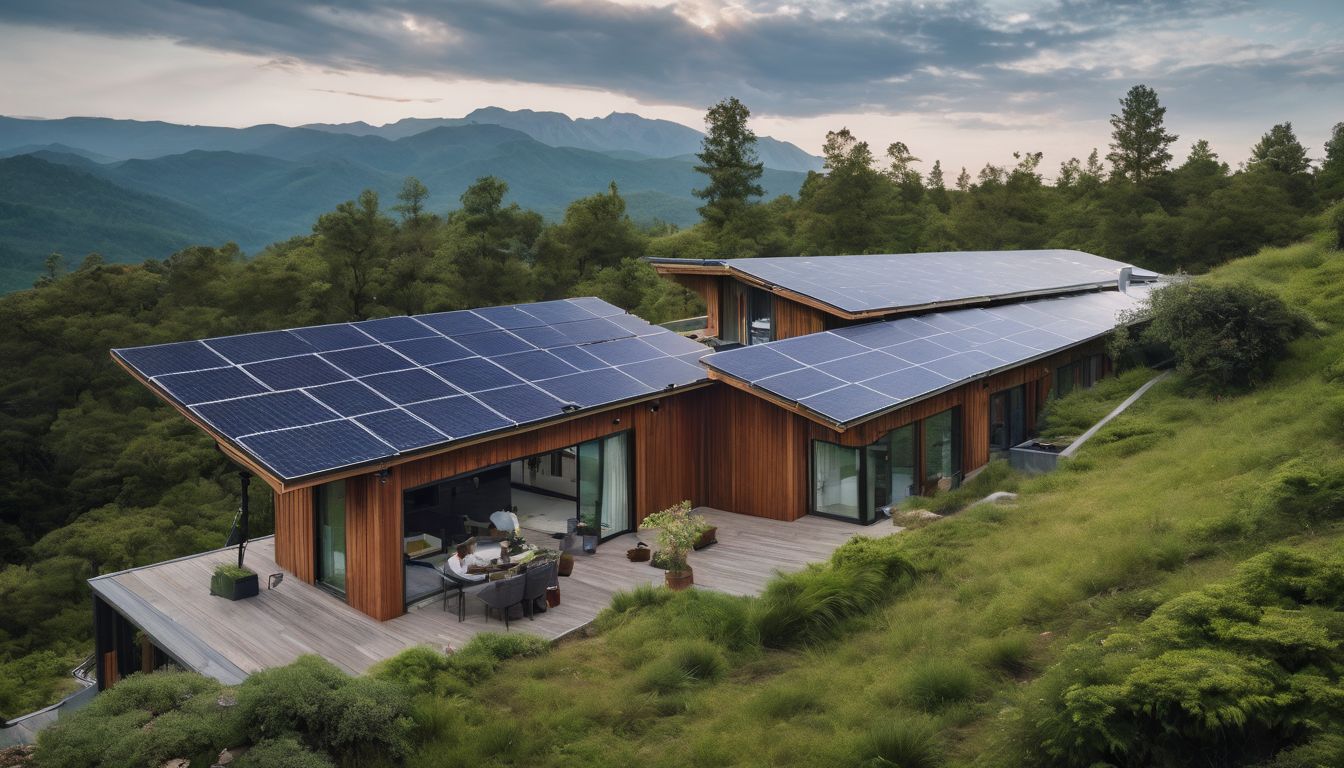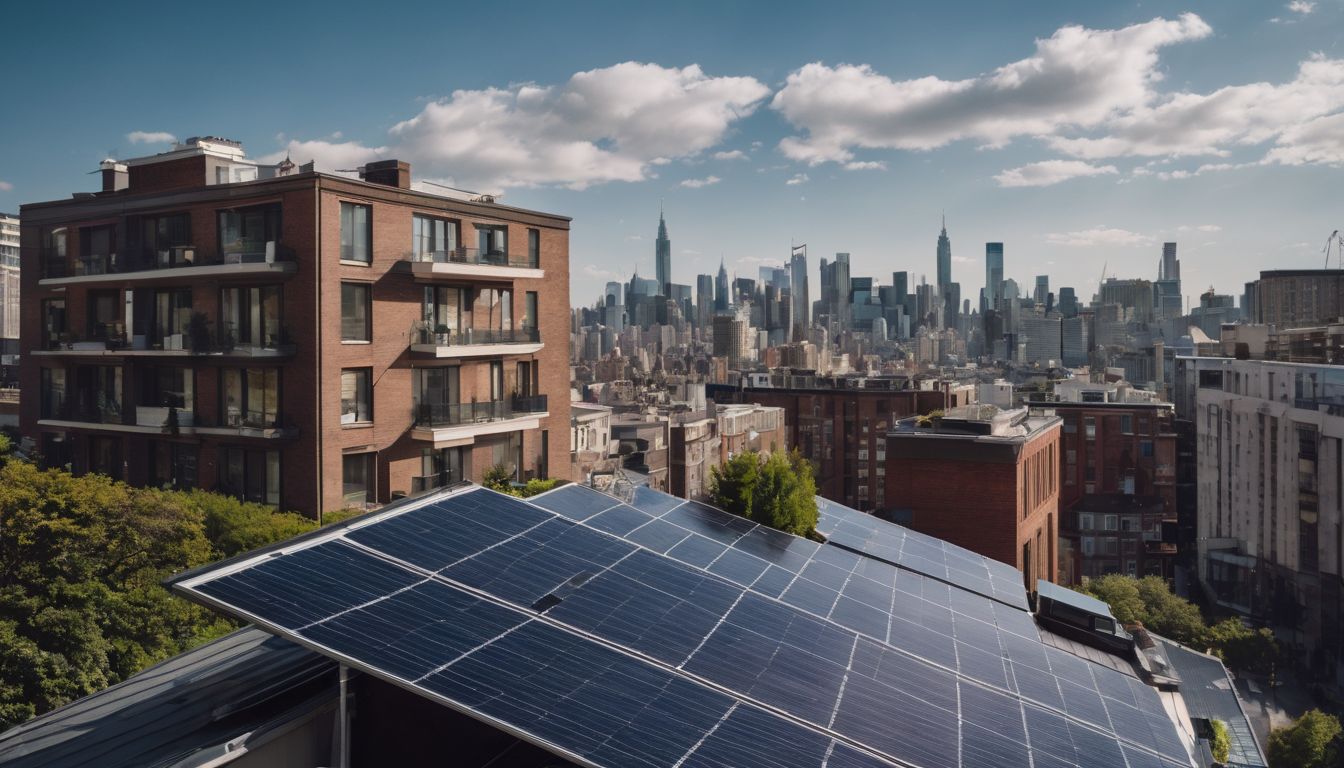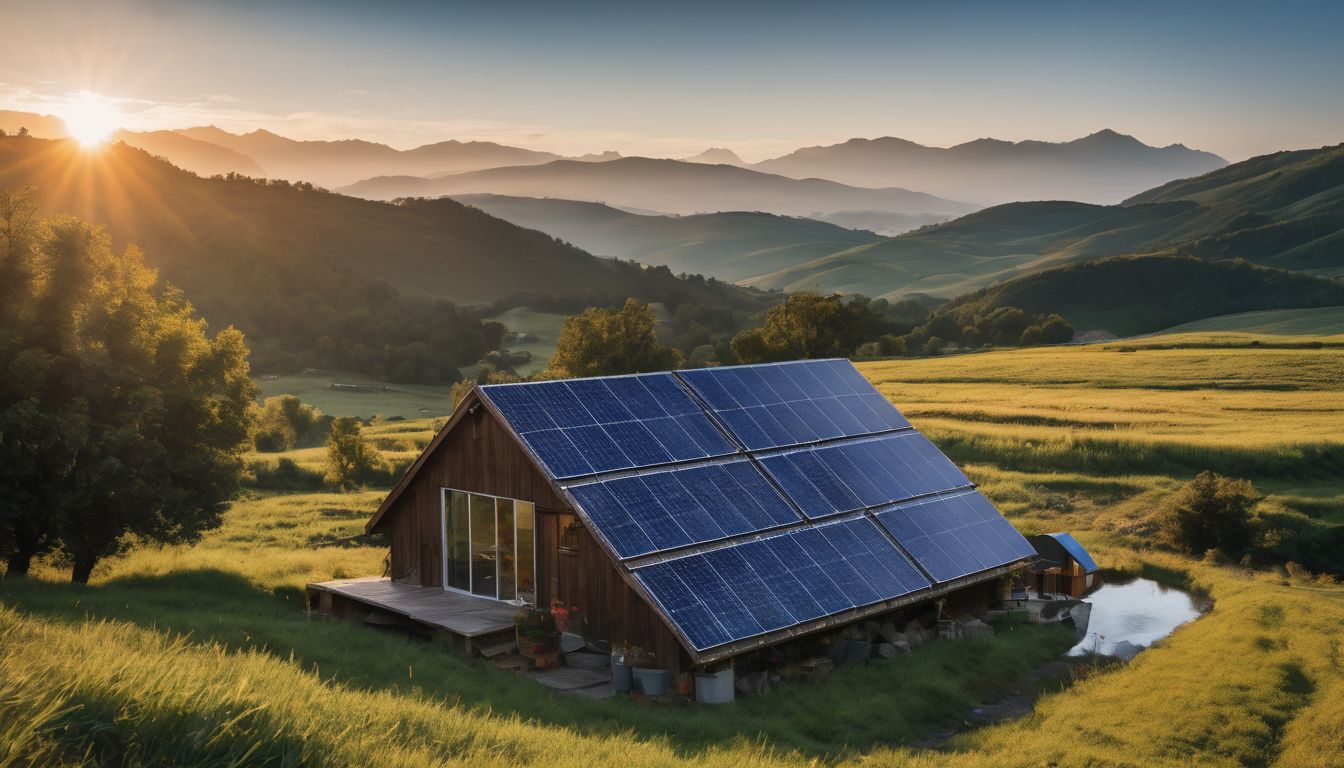Are you looking to cut down on your energy bills and help the planet? The power of the sun can now fuel more than just calculators; solar panels are reshaping home electricity. This article will show you how linking solar power with smart home technology creates a seamless, cost-effective energy solution for your house.
Discover the bright future of living smarter!
Key Takeaways
- Solar power integration with smart home technology can significantly reduce electricity bills, increase property value, and offer access to tax incentives.
- Home automation systems enhance the efficiency of solar energy in smart homes by enabling real-time monitoring and control over energy consumption and appliance use.
- The initial costs associated with solar panel installation and smart home upgrades can be offset by long-term savings on utility expenses and environmental benefits.
- Compatibility between solar panels, home automation devices, and existing home systems is crucial for seamless operation and maximising energy efficiency.
- Regular maintenance of both solar panels and smart home technologies is essential to ensure their longevity and optimal performance.
Solar Energy and Smart Homes – A Perfect Pair
Solar energy and smart homes go hand in hand, offering numerous benefits such as reduced energy costs, environmental sustainability, and the convenience of home automation. Home automation plays a key role in optimising the use of solar energy for greater efficiency and control.
Benefits of solar energy for smart homes
Harnessing solar energy can significantly boost the efficiency of smart homes. It provides a clean and reliable power source that aligns with the values of environmentally conscious homeowners.
- Reduces electricity bills: Homes equipped with solar panels generate their own power, which means less reliance on the grid and lower monthly energy costs.
- Increases home value: Properties with solar energy systems often have higher resale values, appealing to buyers who value sustainability.
- Grants access to tax incentives: Many governments offer rebates and tax breaks for residential solar installations, making it financially attractive for homeowners.
- Promotes energy independence: With your own power source, you reduce your dependence on utility companies and protect yourself against fluctuating energy prices.
- Integrates seamlessly with home automation: Solar panels work hand-in-hand with smart home systems to optimise energy use throughout different devices and appliances.
- Provides clean energy: Solar power is a renewable source that reduces greenhouse gas emissions, helping to minimise your home’s environmental footprint.
- Ensures reliability during outages: Smart homes with solar panels and battery storage can maintain functionality even when there’s a blackout or grid failure.
- Facilitates real-time management: Smart home technology allows you to monitor and control your solar output easily, providing insights into your daily consumption patterns.
- Enables participation in smart grids: Excess energy produced by your solar system can be sold back to the grid, contributing to community-wide sustainability efforts.
- Supports sustainable living practices: Combining photovoltaic systems with green technology appliances solidifies a commitment to eco-friendly living.
The role of home automation
Home automation plays a pivotal role in maximising the benefits of solar energy for smart homes. With the integration of smart home technology, homeowners can efficiently manage their energy consumption and reduce their environmental impact.
Automated systems enable real-time monitoring and control, allowing users to optimise energy usage and minimise wastage. Additionally, smart home automation systems can synchronise with solar panels to adjust lighting and climate control based on available solar power, further improving energy efficiency.
Integrating solar power with home automation also facilitates seamless coordination between renewable energy sources and household appliances. This enables users to achieve greater overall efficiency by utilising renewable resources as much as possible while reducing reliance on traditional grids.
Integrating Solar Energy with Home Automation
Integrating solar energy with home automation allows for real-time monitoring and data collection, enabling efficient energy management to optimise power usage. It also enables seamless control of lighting and climate systems for a more sustainable, eco-friendly home environment.
Monitoring and real-time data
Smart home energy management systems enable the real-time monitoring of solar power generation, consumption, and storage. By using smart meters and sensors, homeowners can track their energy usage throughout the day.
This data empowers them to make informed decisions about when to use or store energy, optimising their overall consumption.
Solar panel automation for homes allows for seamless integration with smart home technology, providing homeowners with instant access to real-time data on solar power production and usage.
Energy management
Solar power integration with smart home technology allows for efficient energy management. Home automation systems help monitor and optimise energy consumption in real-time, ensuring minimal wastage.
Integrating solar power with home automation enables the seamless control of lighting, climate, and other appliances to maximise energy efficiency.
Smart home energy management systems offer sustainable solutions for optimising solar power usage at home. By automating the control of various appliances and devices, homeowners can effectively reduce their environmental impact while saving on energy costs.
Lighting and climate control
- Energy-Efficient LED Lighting: Smart home integration enables the use of energy-efficient LED lighting, which can be remotely controlled or automated based on occupancy or natural light levels.
- Climate Control Optimisation: Smart thermostats integrated with solar power allow for precise control of heating and cooling systems, optimising energy usage while maintaining comfort.
- Natural Light Utilisation: Automated shading systems can be synchronised with solar power generation to optimise natural light entry, reducing the need for artificial lighting during daylight hours.
- Dynamic Climate Settings: Smart home technology can adjust climate settings based on real-time weather data and occupancy patterns to further enhance energy efficiency.
Challenges and Considerations
When integrating solar power with smart home technology, there are several challenges and considerations to take into account. These include the initial cost of installation, ensuring compatibility with existing home systems, and the ongoing maintenance of solar panels and smart home devices.
Cost
When considering the integration of solar power with smart home technology, the cost factor plays a significant role. The initial investment in solar panels and smart home automation systems can be substantial.
However, it’s important to note that over time, these investments can result in long-term savings on energy bills and contribute to a more sustainable environment. By optimising energy consumption and leveraging renewable sources, smart homes powered by solar energy demonstrate a commitment to eco-friendly living while reducing overall utility costs.
The cost of integrating solar power with smart home technology may include expenses for purchasing and installing solar panels, as well as investing in compatible home automation systems.
Compatibility
When integrating solar power with smart home technology, compatibility is a critical consideration. Ensure that the smart home energy management system can effectively integrate with solar panels to optimise energy usage.
Compatibility between the solar power system and automation devices enables seamless control and monitoring of energy consumption, contributing to more efficient and sustainable living.
Homeowners should also consider compatible smart appliances that work efficiently with solar power integration for optimal energy savings. In addition, ensuring the compatibility of maintenance requirements for both solar panels and smart home devices simplifies upkeep and prolongs their operational lifespan, promoting a hassle-free experience while supporting eco-friendly practices within the household.
Maintenance
When considering the integration of solar power with smart home technology, regular maintenance is essential to ensure optimal performance and longevity. This includes routine inspections of solar panels, cleaning to remove dirt and debris that can affect energy production, as well as checking the functionality of smart home energy management systems.
Regular maintenance helps to identify any issues early on and ensures that your sustainable energy solutions continue to operate efficiently.
In addition, scheduling professional maintenance for both solar panels and smart home automation systems can help address any technical issues or repairs promptly. By staying proactive with maintenance, you can maximise the benefits of renewable energy for your smart home while contributing to environmental conservation efforts.
The Future of Energy Consumption
As we look towards the future, integrating solar power with smart home technology can significantly impact energy consumption and drive change towards a more sustainable future. To learn more about how these innovations shape the way we live, read on.
Impact on the environment
Solar power integration with smart home technology has a positive impact on the environment by reducing reliance on traditional energy sources. By utilising renewable solar energy for smart homes, individuals can significantly lower their carbon footprint and contribute to a more sustainable future.
This shift towards eco-friendly smart home technology encourages conservation and environmental awareness, driving change towards cleaner and greener energy solutions for the future.
Implementing solar panel automation for homes promotes energy efficiency and reduces overall consumption, aligning with the goals of environmentally conscious individuals who support conservation efforts.
Driving change towards a sustainable future
Smart homes powered by solar energy hold the key to driving change towards a sustainable future. By harnessing renewable energy for smart homes, we can significantly reduce our carbon footprint and contribute to environmental conservation efforts.
Embracing eco-friendly smart home technology is crucial in promoting sustainable energy solutions for a greener tomorrow.
As environmentally conscious individuals supporting conservation and environmental sustainability, integrating solar power with smart home technology presents an opportunity to lead the way in adopting renewable energy for a more eco-friendly lifestyle.
The integration of solar power into smart home technology is pivotal in creating efficient and sustainable living spaces that benefit both homeowners and the environment.
Key Takeaways and Conclusion
In conclusion, integrating solar power with smart home technology offers sustainable energy solutions. Home automation plays a key role in optimising energy efficiency. Embracing eco-friendly smart home technology drives change towards a more sustainable future.
Solar-powered home automation solutions pave the way for environmentally conscious individuals to support conservation and environmental impact.
FAQs
1. How does integrating solar power with smart home technology work?
Integrating solar power with smart home technology involves connecting your home’s solar energy system to smart devices, allowing you to optimise energy use for increased efficiency.
2. Can solar power integration make my smart home more eco-friendly?
Yes, using sustainable energy solutions like solar in your smart home makes it more eco-friendly by reducing dependence on non-renewable resources.
3. Will adding solar to my smart home save me money?
Certainly, when you combine solar energy and home energy optimisation through a smart system, it leads to lower electricity bills due to enhanced efficiency and self-generated power.
4. What are some benefits of having a solar-powered automation solution in my house?
Solar-powered automation in your house allows for seamless control over appliances, improves overall energy management, and contributes to a green environment while keeping your household technologically advanced.





